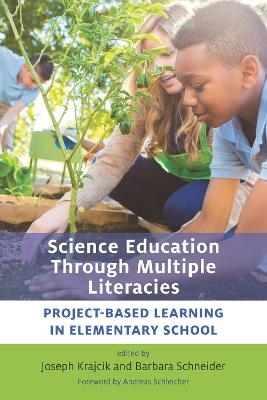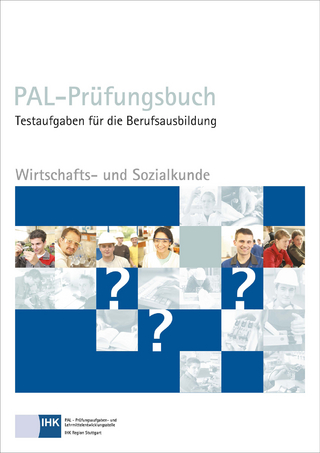
Science Education Through Multiple Literacies
Project-Based Learning in Elementary School
Seiten
2021
Harvard Educational Publishing Group (Verlag)
978-1-68253-662-9 (ISBN)
Harvard Educational Publishing Group (Verlag)
978-1-68253-662-9 (ISBN)
Explores how the use of project-based learning in elementary science education fosters a lifelong scientific mindset in students. The book provides educators with the teaching practices to help students develop an overall science literacy that aligns with Next Generation Science Standards.
Science Education Through Multiple Literacies explores how the use of project-based learning in elementary science education fosters a lifelong scientific mindset in students. The book provides educators with the teaching practices to help students develop an overall science literacy that aligns with Next Generation Science Standards.
Editors Joseph Krajcik and Barbara Schneider and the book’s contributors offer a comprehensive overview of the Multiple Literacies in Project-Based Learning (ML-PBL) approach to science learning, which interweaves scientific ideas and practices, language literacy, and mathematical thinking. ML-PBL supports the teaching of science by paralleling what scientists do: it engages students and their teachers in investigating real-world questions, constructing models, and using evidence to evaluate claims.
The book presents compelling case studies of ML-PBL, how teachers use them, and how the teachers’ enactment transforms the classroom into an environment that builds and supports academic and student SEL. Representing both urban and suburban schools, the case studies include classroom observations, student and teacher interviews, and student artifacts to illustrate how to make science relevant in students’ lives.
Krajcik and Schneider note that classroom enactment of ML-PBL requires intentional instructional practices and new ways of thinking about what it means to learn. Easing this challenge, they equip elementary science teachers with curricular resources including high-quality instructional materials, professional-learning exercises, and formative assessments.
Science Education Through Multiple Literacies provides the necessary elements to transform science teaching and learning so that students learn the skills to navigate with confidence through our complex world.
Science Education Through Multiple Literacies explores how the use of project-based learning in elementary science education fosters a lifelong scientific mindset in students. The book provides educators with the teaching practices to help students develop an overall science literacy that aligns with Next Generation Science Standards.
Editors Joseph Krajcik and Barbara Schneider and the book’s contributors offer a comprehensive overview of the Multiple Literacies in Project-Based Learning (ML-PBL) approach to science learning, which interweaves scientific ideas and practices, language literacy, and mathematical thinking. ML-PBL supports the teaching of science by paralleling what scientists do: it engages students and their teachers in investigating real-world questions, constructing models, and using evidence to evaluate claims.
The book presents compelling case studies of ML-PBL, how teachers use them, and how the teachers’ enactment transforms the classroom into an environment that builds and supports academic and student SEL. Representing both urban and suburban schools, the case studies include classroom observations, student and teacher interviews, and student artifacts to illustrate how to make science relevant in students’ lives.
Krajcik and Schneider note that classroom enactment of ML-PBL requires intentional instructional practices and new ways of thinking about what it means to learn. Easing this challenge, they equip elementary science teachers with curricular resources including high-quality instructional materials, professional-learning exercises, and formative assessments.
Science Education Through Multiple Literacies provides the necessary elements to transform science teaching and learning so that students learn the skills to navigate with confidence through our complex world.
Joseph Krajcik serves as director of the CREATE for STEM Institute and is the Lappan-Phillips Professor of Science Education at Michigan State University. Barbara Schneider is the John A. Hannah University Distinguished Professor in the College of Education and the Department of Sociology at Michigan State University.
| Erscheinungsdatum | 01.12.2021 |
|---|---|
| Verlagsort | Cambridge |
| Sprache | englisch |
| Maße | 150 x 230 mm |
| Gewicht | 310 g |
| Themenwelt | Schulbuch / Wörterbuch |
| Sozialwissenschaften ► Pädagogik ► Berufspädagogik | |
| ISBN-10 | 1-68253-662-9 / 1682536629 |
| ISBN-13 | 978-1-68253-662-9 / 9781682536629 |
| Zustand | Neuware |
| Informationen gemäß Produktsicherheitsverordnung (GPSR) | |
| Haben Sie eine Frage zum Produkt? |
Mehr entdecken
aus dem Bereich
aus dem Bereich
Buch | Softcover (2022)
Schlütersche (Verlag)
49,95 €
Buch | Softcover (2020)
Christiani, Paul (Verlag)
27,70 €
Fragen und Antworten zur Prüfungsvorbereitung für die Kurse …
Buch | Softcover (2023)
Deutsche Vereinigung für Wasserwirtschaft, Abwasser und … (Verlag)
42,00 €


